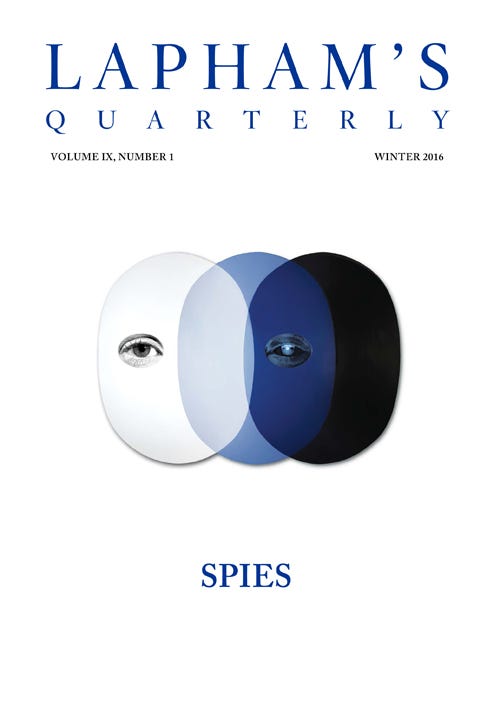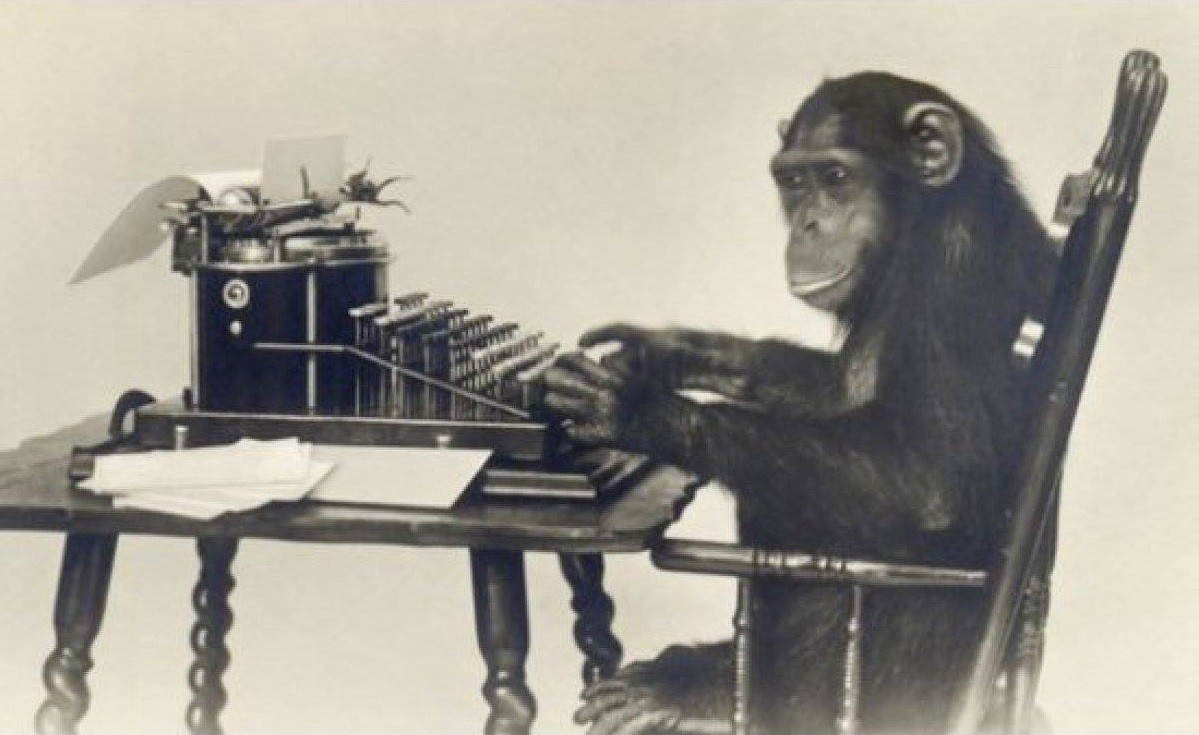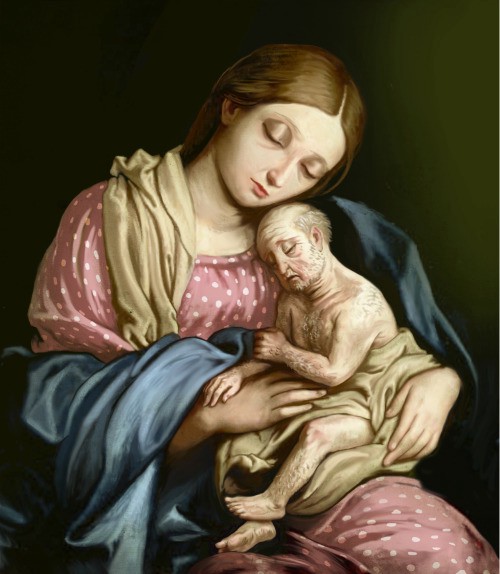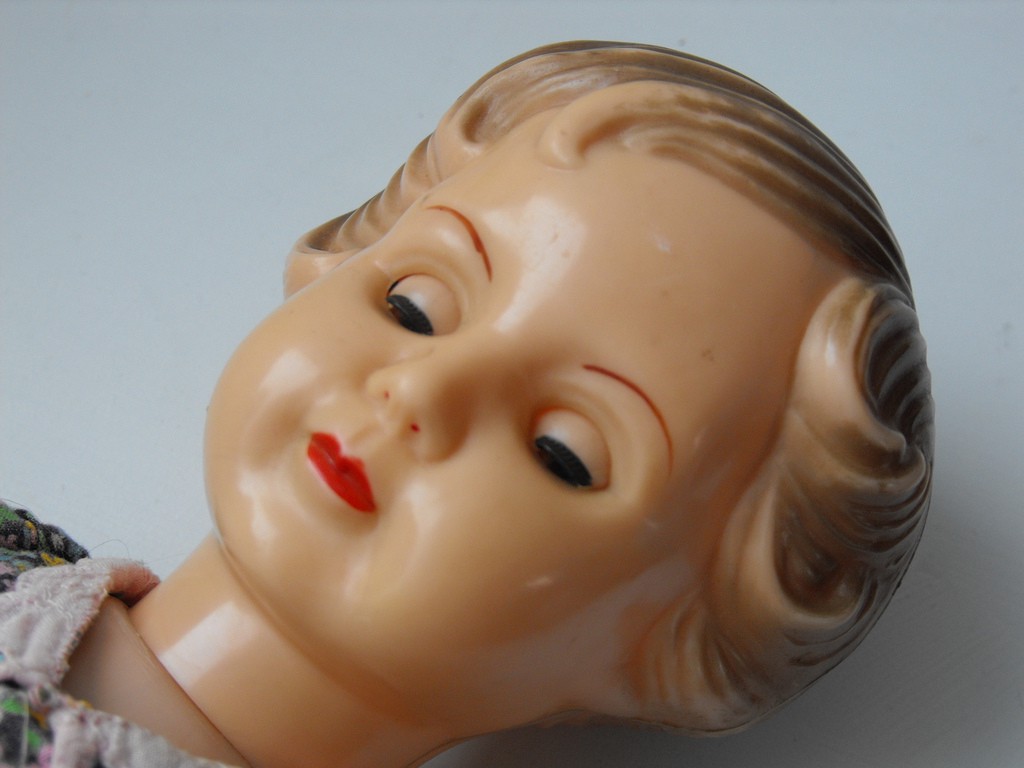Lit Mags
The Three Hundred and Sixty-Five Apartments (or Back Rooms)
by Jules Romains, recommended by Lapham’s Quarterly

AN INTRODUCTION BY LAURENT MERCERON
For the latest Lapham’s Quarterly issue, “Spies” (Winter 2016), we looked to expand the topic beyond the realm of cloak and daggers. What better way than with secret societies, the subject of “The Three Hundred and Sixty-Five Apartments”? The Swiss psychologist Carl Jung believed that “the very beginnings of societal structures reveal the craving for secret organizations. When no valid secrets really exist, mysteries are invented or contrived to which privileged initiates are admitted.” The protagonist of Jules Romains’ “The Three Hundred and Sixty-Five Apartments” is given a rare opportunity to step through the looking glass and see the invention firsthand.

Romains’ writings are little read in English-speaking countries these days. It’s understandable given that his major work is a twenty-seven-volume novel cycle that features hundreds of characters. Men of Good Will, from which this excerpt is taken, was his attempt to recreate the era of French society that existed from 1908 to 1933. The story of the three hundred and sixty-five apartments takes place in Paris around 1919, however its chief concern is with a secret supposedly lost to time. That the main conceit of the story may have been suggested to Romains by the surrealist Louis Aragon hints at the possibility that it was actually thrown into Men of Good Will as a hoax, a modernist concoction intended to have the feel of established lore.
My own discovery of “The Three Hundred and Sixty-Five Apartments” felt like the uncovering of a secret. I came across it in a little-known book entitled Heart of Europe: An Anthology of Creative Writing in Europe, 1920–1940. The book formerly belonged to my grandfather and was passed along to me after he died. Published in 1943, in the middle of World War II, it’s filled with essential writers, many of whom quickly became favorites of mine: André Gide, Louis Aragon, Luigi Pirandello, Miguel de Unamuno, Karel Čapek, Jaroslav Hašek, Joseph Roth, Maurice Maeterlinck, Hermann Hesse, and, of course, Jules Romains.
Reading the book can feel like traveling back in time. A note on the copyright page reads: “This is a wartime book. Size, weight of paper, and margins have been reduced to conserve material necessary for the war effort.” Some of the writers’ biographical entries contain up-to-the-minute news on their wartime whereabouts. In his preface, co-editor Klaus Mann, son of the German novelist Thomas Mann, announces that “as this book goes to press, I am on the point of leaving with my unit for an ‘unknown destination.’”
The characters in “The Three Hundred and Sixty-Five Apartments” also set off for unknown territory, though it might be said that time rather than location is the principal displacement. As for mood, the story’s unusual attention to sensory details makes for a degree of voyeurism that’s haunting and difficult to shake off, and yet the overall effect of this cock-and-bull story is strangely comical. A devious tale in the hands of a shrewd, calculating writer. Romains just might be due for a resurgence.
Laurent Merceron
Associate Editor, Lapham’s Quarterly
The Three Hundred and Sixty-Five Apartments (or Back Rooms)
Jules Romains
Share article
by Jules Romains
Excerpted from Men of Good Will
Translated by Gerard Hopkins
“You’ve really never heard it? Perhaps, after all, that’s not very surprising, since the persons concerned have naturally kept it a secret. On the other hand, when one thinks of all the people who couldn’t help knowing it, it’s rather surprising that there has been so little leakage.
“It is difficult to know how far back the business goes. The first thought that comes to one is that it ought to be possible to give a date by finding out the age of the houses concerned. A number of them are, indeed, of almost exactly the same date. But if one presses the investigation, one finds oneself coming up against some that are older, others that are more recent. The thing must have begun a long time ago. Where precisely, and at what date? Some of those who are in the secret may know of some tradition. I don’t. Probably during the Ancien Régime. The business must have continued during the Revolution, when it undoubtedly had a particular value. But the probability is that the systematic development of the scheme, the attempt to complete what had been already begun, belongs to the first third of the nineteenth century. True, the person to whom I owe most of my information on the subject is a woman, and women’s memory for facts is often erratic; but she told me that her own knowledge was derived from her grandfather, from whom she gathered that the system had been completed between the reign of Louis Philippe and the middle of the reign of Napoleon III, when Haussmann was busy with his great improvement plans. During those years the work seems to have gone on uninterruptedly, to have functioned perfectly in accordance with the original intention of its inventors, and to have rendered certain important, and at times rather remarkable, services, particularly, as you might guess, during the troubled period that began with the revolution of 1848 and continued up to the time of the coup d’état.
“But I haven’t really explained the thing to you yet, though you must have read a good deal between the lines of what I have been saying. The best thing I can do, I think, is to describe to you how I first stumbled on the secret. One day I was visiting a certain lady, a very great friend of mine, and a member, as one says, of the very highest social circles. She lives in a handsome apartment in the middle of Paris, not far from my own home, and situated in one of those quarters that today are no longer very popular because the streets are too noisy and too dark, the elevators too old, the bathing arrangements too crude, the rooms too high and too big and difficult to heat and furnish. This lady’s apartment is spacious, full of odd corners and unsuspected passages, with a door half-lost in a wealth of carved wood — the kind of thing that I adore. She herself is young, very lovely, and married. Her husband, on this occasion, was not at home — as, thank God, is frequently the case. I had got back into my clothes and was perfectly decent. She, on the other hand, had merely slipped on a pretty little house gown; her hair was not very tidy, and she was wearing on her feet a pair of bedroom slippers. She was in a lively and forthcoming mood. Suddenly, after a moment’s apparent hesitation, she said: ‘I’m going to show you something!’ She took a key from a drawer and motioned me to follow her. At the far end of the boudoir she opened a door that I had already noticed, which was not locked. Passing through it we found ourselves in one of those narrow passages to which I have referred. I had seen it of old, but had never walked down it. It can’t have been more than ten yards or so long. At the far end was a large curtain of faded velvet that masked a door. This door my friend opened with the key which she had brought with her. She closed it behind us, though leaving it unlocked. We were in another rather wider but shorter passage. We crossed a large, ill-lit room that seemed to be used as a storeroom, and took a third passage that ended in a dark but very large anteroom. Before reaching it we passed a door behind which we could hear people talking. From the anteroom we could see, through a wide open double door, a large drawing room with a heavy hanging luster. But we did not enter it. I had the impression we were no longer in my friend’s flat, but that the place where we found ourselves was by no means uninhabited. Everything bore evidence of the routine of daily life. My friend led me out of the anteroom down yet another passage. From this point onward she seemed to have to think for a moment before getting her bearings and choosing one door in preference to another. She stopped before what I took to be the door of a wardrobe, opened it with the key she had already used, and, following hard on her heels, I penetrated into a largish room, lit by a window of ground glass, which seemed to be a dressing closet furnished with large cupboards of painted wood. Many little signs indicated that we had crossed over into another flat. My friend went straight over to a small door that stood in the corner of the closet between one of the cupboards and the outer wall. But she changed her mind and, with a smile, still saying nothing, she approached a larger double door that stood opposite us more in the middle of the wall. She gave two or three discreet little knocks, which appeared to me to be arranged in a definite rhythmic sequence. Then she listened, at the same time readjusting her wrap, which hung very loosely about her, and giving a pat to her hair. When no reply came to her knocking, she very discreetly opened the door and, without crossing the threshold, made a sign to me to look. I saw a large, handsome room filled with rather worn, old-fashioned furniture. The general effect, however, was one of luxury. It contained a huge, low bed, a number of faded silk curtains, some extremely feminine toilet accessories that appeared to have been recently used, a quantity of rugs, upon one of which stood a pair of slippers that I could have sworn were still warm. Although we made no move to enter, there was something about our gazing at this intimate interior in which, as it were, a faint perfume still hung, that seemed rather barefaced, improbable, and exquisitely indecent. I did not dare to question my guide. I was afraid of breaking the charm. A moment later she closed the door as quietly as she had opened it, and turned back toward the smaller door in the corner of the dressing closet. Passing through it, we found another passage apparently full of odds and ends, which impeded our movement. This we took. Halfway it broadened out into a circular space lit by a window looking onto the street. I glanced out of it and could not help exclaiming: ‘But we’re no longer in your house at all! We must be a long way from it!’ My friend smiled but said nothing and led me a few paces farther. Then, pointing to a long gallery that we had just reached, filled with dark furniture and lit by windows of colored glass, and to what lay beyond, she spoke the first words she had uttered since leaving the room: ‘We could go still farther, but at the far end we should have to descend a staircase. You’ve seen enough, I imagine, to get a pretty fair idea of the place?’ We then retraced our steps to her boudoir.
“It was there, behind closed doors, that she began to explain. She told me that we could have gone on a long way, much further than I had any idea, opening one door after another, always with the same key; that from time to time we should have had to go down flights of steps, sometimes to a considerable depth, at times also to climb; and that if we had gone in the opposite direction — that is to say, leaving her boudoir at the other end — we should have found similar conditions. As you may imagine, I begged her to tell me more. Whither did these two directions lead, and why all these complicated passages? What needs, what secret purposes, did they fulfill? Still smiling, biting her lip in the most charming way, and bringing all her pretty little tricks to bear, she said it was all a deep secret and I had no right to know it. I proved to her by certain agreeable if silent arguments that I had, and little by little she imparted to me the key to the mystery. She pretended at first that one could have gone, in either direction, even as lightly dressed as she was, in a mere wrap and slippers, to ‘the very end of Paris,’ without having to put so much as one’s nose out of doors, and without being seen by any passerby or policeman on duty. The ‘very end of Paris’ to which she had referred turned out to be the end of a Paris of bygone days. If I understood her rightly, one of the ends in question would have been somewhere in the neighborhood of the Place des Vosges or of the Bastille; the other near the old city wall at the rue des Martyrs. This marvelous line of communication between the extremities of the city, this secret way, must, too, have dated from far back. At the time of its completion — if, indeed, it ever had been completed — it must have formed a chain of 365 links, one for each day in the year. In other words, this subterranean route had been constructed by knocking a way through 365 apartments, or rather premises, since I imagine that there must have been a number of private houses in the series. All that my friend could say was the great difficulties had had to be overcome, that ingenious communications had been fashioned up stairs and through cellars, and that it was just where they were concerned that the passage of time had done most damage to the system. She had heard tell, for instance, that the work put in hand by Haussmann had been a real disaster which had never been wholly repaired, and that since that time circulation had been possible only by dint of crossing streets at several points, quickly, it is true, by making a dash from one house door to the door opposite, or from one shop to another. For a fugitive from justice or for men who wanted to escape observation, even such partial secrecy was a good deal better than the casual criminal could expect, though it fell far short of the former conditions of almost incredible security — or for those who wanted to move about lightly clad. Sometimes, alas, the breaches made by Haussmann were more serious. Whole islands of houses had disappeared, or been replaced by new buildings. It is not hard to imagine the difficulties of re-establishing communications under such conditions, given the need for secrecy, and the number of workmen who would have had to be trusted. But the final straw seems to have been the new sewage system of Paris and the excavations made during the construction of the metro. It is easy to see why. My impression is that since then the route exists only in odd patches and that the adepts have more or less given up the struggle. There is nothing to prevent us imagining, in all their details, the strange reasons that made such an enterprise possible, which set it going, brought it to perfection, and maintained it in working order. No need to seek one and one only. No doubt politics entered into it in part. There must have been people who wanted a safe method of communication that could not be interfered with from outside, and safe lines of retreat. Let us imagine, for instance, the case of a man who had got mixed up in some plot or other, who was suspected of murder — political murder, perhaps. He would know that he was being hunted. Assume, for the sake of argument, that he lived near the Châtelet. The approaches to his house would be guarded. The police would be quite sure that he could neither pay nor receive visits without their being aware of the fact. They could decide on making the arrest in their own time. He would be careful never to go out except, quite deliberately, for an occasional walk down to the quay to look at the caged birds offered for sale there, and on such occasions he would be followed by four cops. But at any time he would be free to meet his friends at, say, the Clichy gate, or nearer still, at some spot in the center of the city. If the rendezvous was not actually in one of the 365, he would merely have to set out from the doorway of some house where he was unknown and unwatched. And if one day he got wind of the fact that men were waiting to arrest him at his own street entrance, he could escape danger by emerging into the open air at some point a long way off, or he could find a new hideout that no one would ever suspect and which he could reach from some point in the chain. At periods — and there have been many of them — when political plotting was a permanent feature of life, such advantages must have been invaluable and worth every effort to maintain. I had a vague but very definite feeling while my fair friend was slipping along those strange passages, with her wrap carelessly fastened and her bare feet tucked into slippers, or when, after knocking so discreetly, she made me lean on her shoulder and look into that warm, intimate interior, so that I felt almost as though I were peeping through the interstices of silk underwear. That room had been the scene of many pleasures, I dare swear, of delights and abandonments. I tried to get my friend to admit it. She replied, laughing, that if one were to believe everything one heard, there would be no end to it. She had been told, she said, that at one time the men in the secret had had the ‘right of free hunting,’ but that of course, or so she maintained, was only a story. ‘It must,’ she said, with a delicious little gurgle, ‘have been something like the droit du seigneur. But all that must have stopped a long time ago, even admitting that it ever existed.’ She agreed, however, that in view of the facilities presented, and the peculiar freedom of the relations which those in the know must have enjoyed, things almost certainly happened that we should hardly believe nowadays. It was her convinced opinion, however, that such things had occurred only between persons bound by a bond of close relationship, and even then only at certain points in the chain; and that it would be extremely foolish to imagine that there had ever been a time when the spirit of licentious orgy ran like firedamp through these urban mine-galleries. She assured me that, so far as she knew, nothing of that sort, ‘or almost nothing,’ now remained. ‘I should like,’ said I with an anxious glance, ‘to be as convinced of that as you are.’”








